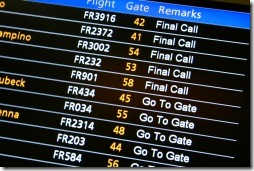Another amazing statistic – across 46 states in USA there were more than 630,000 laptop computers reported lost in the past year. That’s more than 12,000 a week. And when you consider that most people still keep documents on their laptop computer when they travel they haven’t just lost a piece of hardware, they’ve potentially lost control of private and confidential documents.
What can you do?
 Laptops can be insured. Anyone who carries a laptop around for work would have it insured, it’s just a cost of doing business. Nothing new here.
Laptops can be insured. Anyone who carries a laptop around for work would have it insured, it’s just a cost of doing business. Nothing new here.
As for the documents stored on them, delete them before you travel!. If this sounds extreme then you need to wake up and realise what’s happening in the world.
At many airport security checkpoints customs officers now have the authority to look at the contents of your laptop’s hard drive before they let you board the plane or enter a country. And they don’t always just "look" – sometimes they make a copy of your hard drive so they can look more closely at a later time. Is this legal? Yes, in some places (including most US airports today). Read more about this in this article.
So you now have two reasons to delete all documents from a laptop before travelling:
- You could lose your laptop (like 630,000 other people each year in one country alone).
- You could be asked to hand over your laptop’s data to customs officers.
What a lot of large organisations do these days is hand their employees "clean" laptops that have no documents on them. Employees are given VPN access, so when they arrive at their destination they can access their office network and carry on with their regular work. If you’re new to the concept of a VPN read our previous article on its benefits. Another trick is to carry your files on a USB flash drive, and hide it in your wallet or luggage. This could be encrypted as well for security, in case you lose it.
Whole disk encryption is another technology that can help you with lost laptops. Whole disk encryption makes the entire contents of the laptop useless without a password. There’s no known way to recover the data. There are still two risks with this method:
- You need the support of your IT department to ensure your organisation can restore your data in case you lose the password. Encryption management is not difficult for IT departments. For individuals it can be a burden.
- If customs officers insist on seeing the contents of your laptop’s files you need to hand over the password, and they get to read and even copy your files. This is legal in most western countries, it’s not enough to tell them you forgot the password.
Now if you’re thinking that your laptop needs a password to startup and that this is enough to stop people, remember that the files on your laptop’s hard drive can be copied without a password. You just need to pull out the hard drive (easy to do with laptops). Whole disk encryption is the only effective password protection for laptops.
 And while we’re talking about travelling now’s a good time to remind you not to trust free or hotel wireless networks. You never know who’s monitoring the network traffic (read our previous article on this).
And while we’re talking about travelling now’s a good time to remind you not to trust free or hotel wireless networks. You never know who’s monitoring the network traffic (read our previous article on this).
Read the study on lost laptops here, sponsored by Dell.
So in summary:
- Insure your laptop to recover the cost of the hardware and software
- Delete all files from the laptop before you travel. Use another technique to gain access to them when you arrive (either a VPN or a hidden and encrypted USB flash drive).
 Laptops can be insured. Anyone who carries a laptop around for work would have it insured, it’s just a cost of doing business. Nothing new here.
Laptops can be insured. Anyone who carries a laptop around for work would have it insured, it’s just a cost of doing business. Nothing new here. And while we’re talking about travelling now’s a good time to remind you not to trust free or hotel wireless networks. You never know who’s monitoring the network traffic (
And while we’re talking about travelling now’s a good time to remind you not to trust free or hotel wireless networks. You never know who’s monitoring the network traffic ( Old web browsers have security flaws and vulnerabilities. You’re meant to update your web browser to the latest version because the developers have worked hard to patch it and fix up security holes. And in almost every case an upgrade is completely free. Why would anyone choose to use an old browser?
Old web browsers have security flaws and vulnerabilities. You’re meant to update your web browser to the latest version because the developers have worked hard to patch it and fix up security holes. And in almost every case an upgrade is completely free. Why would anyone choose to use an old browser? The answer is millions of dollars.
The answer is millions of dollars.  An Australian security organisation called AusCERT has conducted a survey and come up with the following results. I’ve added my own comments on the right.
An Australian security organisation called AusCERT has conducted a survey and come up with the following results. I’ve added my own comments on the right. Gartner is a well recognised research company. They’ve recently added up the numbers and come up with 3.6 million adults that lost money in 2007 due to phishing scams. In 2006 the figure was 2.3 million.
Gartner is a well recognised research company. They’ve recently added up the numbers and come up with 3.6 million adults that lost money in 2007 due to phishing scams. In 2006 the figure was 2.3 million.